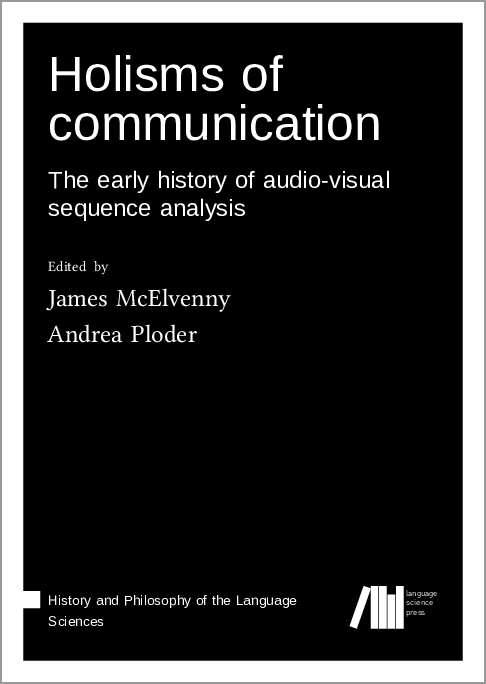We log anonymous usage statistics. Please read the privacy information for details.
Holisms of communication: The early history of audio-visual sequence analysis
Synopsis
A central pillar of contemporary communication research is the analysis of filmed interactions between people. The techniques employed in such analysis first took on a recognizably modern form in the 1970s, but their roots go back to the earliest days of motion picture technology in the late nineteenth century. This book presents original essays accompanied by written responses which together create a dialogue exploring early efforts at audio-visual sequence analysis and their common goal to capture the "whole" of the communicative situation.
The first three chapters of this volume look at the film-based research of Gestalt psychologists in Berlin as well as psychologists in the orbit of Karl and Charlotte Bühler in Vienna in the first decades of the twentieth century. Most of these figures – along with many other Central European scholars of this era – were driven into exile in the United States after the rise of National Socialism in the 1930s. This scientific migration led to the cross-pollination of communication studies in America, an outcome visible in the leading project in interaction research of the mid-twentieth century, the Natural History of an Interview. The following two chapters examine this project in its historical context. The volume closes with a critical edition of a treasure from the archives: the transcript of a speech delivered by Ray Birdwhistell, a key participant in the Natural History of an Interview project and founder of kinesics.
Chapters
-
Capturing the whole
-
Kurt Lewin und Fritz Heider: Ihre Freundschaft, ihre Filme und ihre Theorien
-
Feedback, Sozialkybernetik, Democratic Social Engineering. Kommentar zu Helmut Lück
-
Kurt Lewin und Fritz Heider in der Vorgeschichte der US-Kommunikationswissenschaft
-
Kurt Lewin’s wide-ranging influence on the history of qualitative research. Response to Helmut Lück and Clemens Knobloch
-
Hans Hermas Überlegungen zur Bildhaftigkeit des Films im Vergleich mit anderen Darstellungsformen – Vorstellung einer Arbeit aus den Forschungen zum Film am Wiener Institut für Psychologie in den 1930er Jahren
-
Das nichtsprachliche Darstellungsmittel Film – Diskussionen am Wiener Psychologischen Institut. Kommentar zu Maria Czwik
-
Perception, awareness, and film practice: A natural history of the “Doris Film”
-
A question of perspective. Response to Henning Engelke
-
Film as Observation and Experiment. Response to Henning Engelke
-
The Natural History of an Interview and the Microanalysis of Behavior in Social Interaction: A Critical Moment in Research Practice
-
Histories of Progress and Media Histories. Response to Wendy Leeds-Hurwitz and Adam Kendon
-
The Natural History of an Interview and the emergence of video-based multimodal studies of social interaction. Response to Wendy Leeds-Hurwitz and Adam Kendon
-
Retracing “The Natural History of an Interview”. Response to Wendy Leeds-Hurwitz and Adam Kendon
-
The NHI and visual anthropology. Response to Henning Engelke
-
On some lessons of the NHI project and its forgotten holism of communication. Response to Wendy Leeds-Hurwitz, Adam Kendon and Henning Engelke
-
The heritage of the NHI. Response to H. Walter Schmitz
-
Ray L. Birdwhistell, “Lecture at American Museum of Natural History, October 4, 1980”




